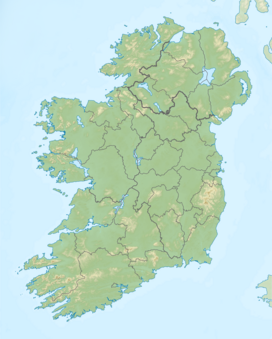Knockeyon
| Knockeyon | |
|---|---|
| (Cnoc Eoghain) | |
 Knockeyon on a foggy morning | |
| Highest point | |
| Elevation | 214 m (702 ft)[1] |
| Prominence | 128[1] m (420 ft) |
| Coordinates | 53°37′24.3″N 7°17′49.6″W / 53.623417°N 7.297111°W |
| Geography | |
| Location | County Westmeath, Ireland |

Knockeyon (Template:Lang-ga) is a hill in County Westmeath, Ireland. When viewed from the Ranaghan, and Gillardstown side of the hill, it dominates the surrounding lakes in the countryside of northern County Westmeath.
Location
The hill is on the southeastern shore of Lough Derravaragh and oversees much of the north Leinster countryside.
Ancient chapel
The ruins of an ancient chapel, built by Saint Cauragh and dedicated to Saint Eyon, are halfway up the hill.
The chapel was cut out of the natural rock, and is believed to have never possessed a roof.[citation needed] The ruins of Saint Cauragh's Well are adjacent to this chapel; its waters were believed to have miraculous properties.[citation needed]
Habitat
Knockeyon and other surrounding hills support deciduous woodland which mostly consists of native species. Hazel, rowan, ash and oak are abundant. Exotic species occur occasionally, including beech.
The neighbouring Knockbody Wood is inhabited by wild pheasant and is a popular attraction for local pheasant hunters. On occasions the Common pochard (Aythya ferina) population, which is one of the largest in Ireland,[2] has exceeded the threshold for international importance. (i.e. 3,500 individual fowl).[3]
| Wild fowl | Winter 96 (individuals) |
|---|---|
| Little grebe | 42 |
| Great crested grebe | 34 |
| Cormorant | 34 |
| Mute swan | 159 |
| Whooper swan | 102 |
| Greenland white-fronted goose | 409 |
| Wigeon | 207 |
| Teal | 52 |
| Mallard | 195 |
| Pintail | 6 |
| Shoveller | 12 |
| Pochard | 3,129 |
| Tufted duck | 1,073 |
| Goldeneye | 46 |
| Coot | 1,358 |
| Golden plover | 158 |
| Lapwing | 1,079 |
References
- ^ a b Knockeyon, mountainviews.ie
- ^ National Parks & Wildlife Service (2004). "Lough Derravaragh SPA 004043 Site Synposis" (PDF). www.npws.ie. Archived from the original (PDF) on 14 July 2014. Retrieved 7 June 2014.
{{cite web}}: Unknown parameter|deadurl=ignored (|url-status=suggested) (help) - ^ British Trust for Ornithology (2011). "Species Threshold Levels". www.bto.org. British Trust for Ornithology. Retrieved 7 June 2014.
External links


